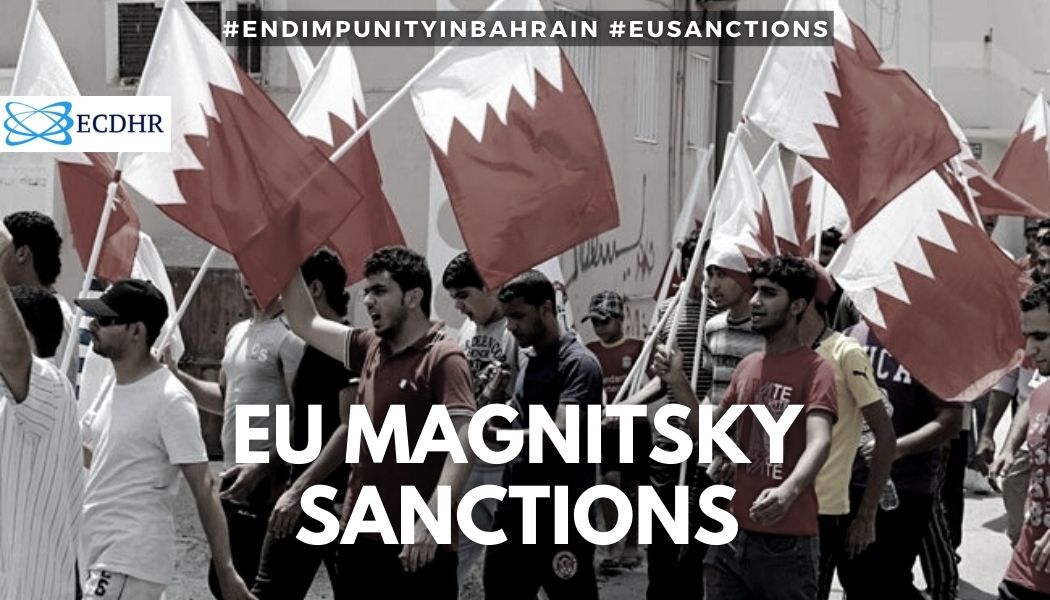If you would like to watch the full event, you can do so here.
14 June 2021: The European Centre for Democracy and Human Rights (ECDHR), with UK-based lawyers, Michael Polak of Church Court Chambers and Annahita Moradi of One Pump Court, launched a legal campaign to utilise the EU Global Human Rights Sanctions Regime to end impunity in Bahrain through a panel event.
The event introduced the legal project to implement the EU’s version of Magnitsky sanctions against known perpetrators of human rights abuses in Bahrain. Also on the panel were Ali Mushaima, a Bahraini political activist and son of imprisoned political opposition leader, Hassan Mushaima; and Marc Owen Jones, Assistant Professor in Middle East Studies and Digital Humanities at Hamad Bin Kalifa University (Doha) and author of ‘Political Repression in Bahrain’.
Annahita Moradi presented a summary of the claims of widespread and systematic human rights abuses perpetrated by the Bahraini Government which, she stated, demand a meaningful response from the international community. Annahita introduced the EU Global Human Rights Sanctions Regime (GHRSR) as providing a new opportunity to place prominent human rights abusers, both individuals and entities, on a sanction list. She argued that this international mechanism would, if used, provide a tangible consequence for those perpetrating and involved in the commission of abuses, and would tackle the deep-rooted culture of impunity in Bahrain.
Michael Polak then detailed the EU GHRSR as a positive addition to the human rights litigation landscape, especially as they allow for the targeting of specific individuals and not the entire state. Michael highlighted how such sanctions which include EU travel bans and the freezing of assets can have an important impact on Bahrain as the political elite have strong links to the EU, and argued that their effectiveness should not be understated as illustrated by a number of examples of the application of similar sanctions around the world. He stated that the necessary evidence for the imposition of the sanctions is available and therefore it should be used as it would send a strong signal that widespread and systematic human rights violations will not be ignored by the international community.
Ali Mushaima provided concrete examples of human rights violations in Bahrain, especially in regards to torture and the plight of prisoners of conscience. Through his testimony, he highlighted that sanctions are one of the only means through which justice can be delivered for those who have suffered from severe human right violations. He also stated that frequency of use and the identity of the targets that the EU focuses on with this new sanctions regime will demonstrate how serious European governments are about defending human rights.
Marc Owen Jones analysed political repression in Bahrain as a long-standing practice. His assessment was that the use of Western diplomacy with Bahrain as a soft means of tackling human rights abuses has proven futile. Marc quantified the abuses perpetrated by the Bahraini Government, highlighting that it has worsened in the past few years. Marc concluded that this legal campaign will go a long way in raising awareness of, and helping to stop, widespread human rights abuses.
Michael Polak of Church Court Chambers who will be Lead Counsel on this case, says: “We are very excited about the opportunity to address impunity for human rights abuses in Bahrain which have been going on for far too long. The case for sanctions against the individuals responsible for the intense repression, including the use of torture and arbitrary executions, is strong. We will be calling on EU states that consider the evidence that we submit to them and to support the designation of those involved.”
Annahita Moradi of One Pump Court Chambers who will be Junior Counsel on this case, says: “The allegations of the abuses committed by the Bahraini Government to crackdown on the people’s dissent include enforced disappearances, arbitrary arrests and detentions, physical and psychological torture, extrajudicial killings, and due process interferences. There has been a marked failure to investigate these claims impartially, effectively and without delay in line with international standards. Bahrain’s ruling family and Government thrive on this culture of impunity. The imposition of these sanctions would send a signal to them and the rest of the world: you will face tangible consequences for any involvement in human rights violations.”
The legal campaign involves considerable legal costs and to move forward with this case we need your help. Please visit our fundraising page for more information.
Press enquiries: akarastamatova@ecdhr.org

